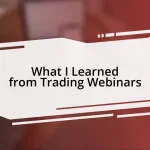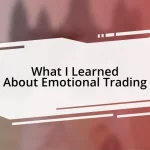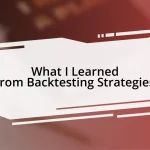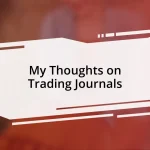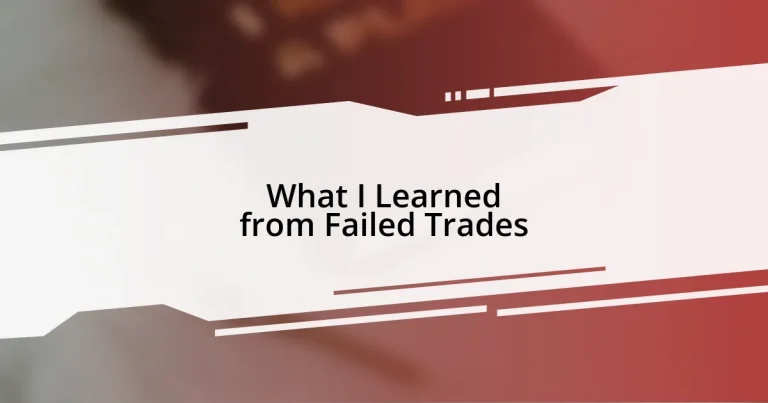Key takeaways:
- Emotional biases and overconfidence can lead to significant losses in trading; acknowledging these biases is crucial for improvement.
- Implementing risk management strategies, such as stop-loss orders and diversification, can prevent large-scale losses and cushion against market volatility.
- Developing a resilient mindset by viewing setbacks as learning opportunities fosters long-term growth and adaptability in trading.
- Engaging with a community for support and feedback can provide valuable insights and help turn failures into future successes.
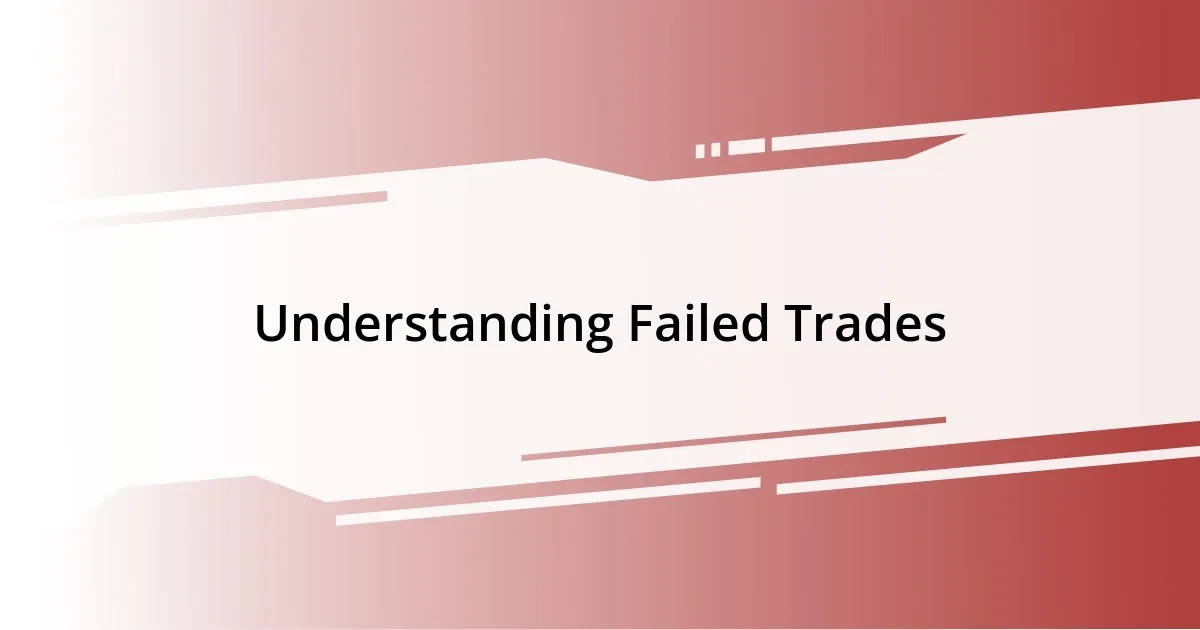
Understanding Failed Trades
Understanding failed trades often starts with acknowledging that mistakes are part of the learning curve. I remember a trade where I was certain about a stock’s upward momentum. I had done my research, but my overconfidence blinded me to warning signs, resulting in a significant loss. Have you ever felt that rush, thinking you’re on the verge of success, only to face the harsh reality? It’s gut-wrenching.
When we dig deeper into the reasons behind failed trades, we often find emotional biases at play. I’ve experienced the pain of holding onto a losing position, convinced it would rebound. It’s fascinating, isn’t it? Why do we cling to hope when logic suggests it’s time to let go? That emotional attachment clouds our judgment and prevents us from making rational decisions.
Reflecting on failed trades cultivates resilience and growth. Each setback has revealed patterns in my trading behavior, encouraging me to adapt. Isn’t it empowering to turn failures into valuable lessons? In hindsight, these experiences have sharpened my skills, guiding me to approach future trades with a more balanced mindset.

Common Mistakes in Trading
Recognizing common mistakes in trading can be a powerful step toward improvement. One major pitfall I’ve encountered is neglecting proper risk management. Early in my trading journey, I once risked far too much on a single trade, convinced it was a sure win. The bitter lesson of losing that entire investment taught me to never underestimate the importance of setting stop-loss orders. Have you ever wagered too much on a high-risk trade, only to be left reeling when things turned sour?
Another frequent mistake I’ve made is failing to stay updated on market news and trends. I remember a time when I stubbornly held onto a position, ignoring key economic indicators that signaled impending trouble. It felt disheartening as my portfolio declined further. This experience highlighted the value of staying informed and adaptable. Don’t you think it’s surprising how much external factors can impact our decisions?
Lastly, I’ve had my share of impulsive trades driven by a fear of missing out (FOMO). One day, after seeing a stock skyrocket in value, I jumped in without doing my due diligence. It was a classic case of chasing the market rather than being strategic. The outcome? A painful loss that taught me to cultivate patience and assess opportunities before jumping in. What have you learned from moments of impulsive trading?
| Mistake | Personal Insight |
|---|---|
| Neglecting Risk Management | My overinvestment in a single trade led to a harsh lesson in losses. |
| Ignoring Market News | Being unaware of trends cost me dearly when I held onto a declining asset. |
| Impulsive Trading | Jumping into a popular stock without research resulted in immediate regret. |

Analyzing Personal Trade Failures
Reflecting on my personal trade failures has been an eye-opening experience. One time, I entered a trade based solely on a friend’s recommendation without doing my homework. The moment I clicked “buy,” a sinking feeling settled in; I knew I had bypassed my own criteria for making informed trades. That decision not only tanked my investment but also taught me the hard way about the importance of trusting my analysis over external influences.
Understanding the factors behind my failed trades has also revealed certain emotional triggers that seem to reroute my judgment. I recall a time when I placed a bet on a stock that was continuously losing value. Instead of cutting my losses like I should have, I let frustration and pride lead my decision-making. I kept hoping it would bounce back, despite knowing the numbers weren’t in my favor. Analyzing this failure helped me recognize the impact of emotions on trading and led to an actionable mindset shift.
- Over-Reliance on Others: Trusting a friend’s judgment over my research resulted in significant loss and regret.
- Emotional Trading Decisions: Holding onto a losing stock out of pride instead of rationality has deepened my understanding of emotional triggers.
- Neglecting Personal Analysis: Bypassing my strategy for quick gains taught me that established criteria must always be the foundation of my trades.

Lessons from My Worst Trades
One of my toughest lessons came from placing too much trust in “hot tips.” There was a time I went all in on a stock that a colleague was raving about, convinced it was a gold mine. I didn’t do my due diligence, and, as the dust settled, I watched my investments dwindle. This taught me that solid research must always precede decisions—have you ever jumped on a recommendation only to regret it later?
Another moment stands out: I aimed for a quick win with an option that was trending way up. Mesmerized by the rising numbers, I ignored the price chart and resisted sticking to my exit strategy. The inevitable drop felt like a punch in the gut. Now, I remind myself that sticking to my plan beats reacting impulsively—how do you handle the temptation to ride the wave of excitement?
Lastly, I won’t forget the time I let a loss linger longer than necessary. I convinced myself it was temporary, holding onto the belief that the stock would recover. But instead of bouncing back, the situation worsened. This experience reinforced the importance of knowing when to cut my losses. After all, staying emotionally tied to an asset can blind us to better opportunities—what strategies do you use to turn losses into lessons?
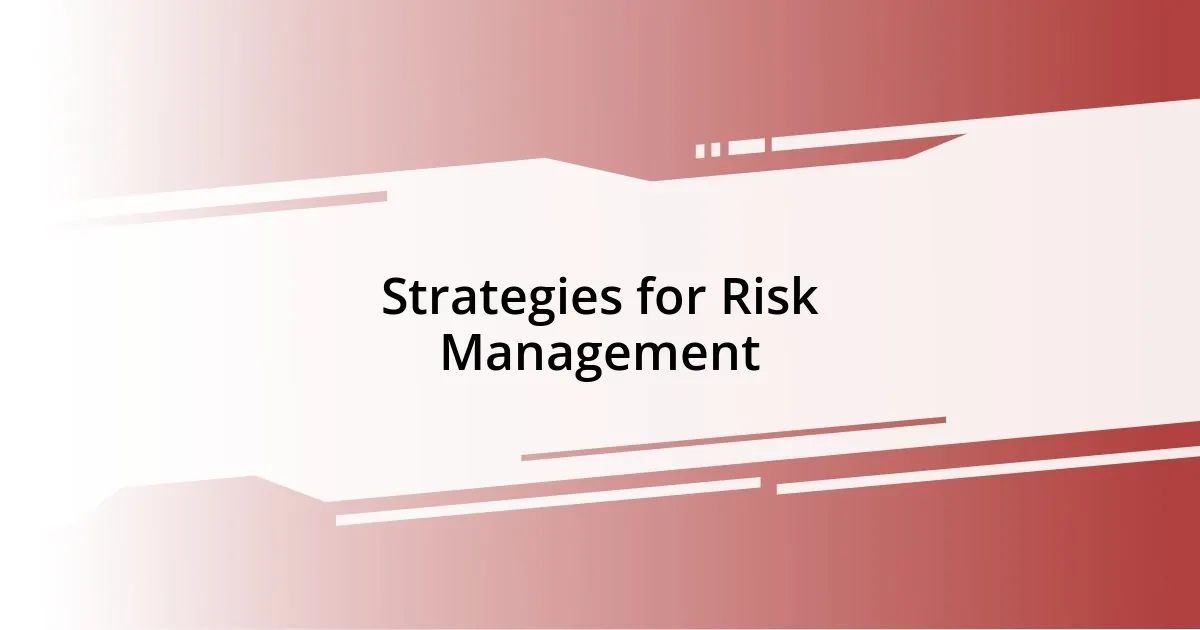
Strategies for Risk Management
I’ve learned that implementing a clear stop-loss strategy can significantly minimize losses in volatile markets. There was a trade where I stubbornly ignored my set threshold, thinking the stock would rally back. Instead, it plummeted, taking my investment down with it. If I had stuck to my plan, I wouldn’t have faced such a painful setback. Do you have stop-loss strategies in place, or do you find yourself getting emotionally attached like I did?
Diversification has also been a game changer for me. Initially, I placed all my bets on one sector, believing I’d ride the wave of its success. When an unexpected downturn hit, it felt like my world was crashing down. Now, spreading out my investments across different assets helps cushion the blow from any one failure. How have you thought about diversification when constructing your portfolio?
I’m a firm believer in regular portfolio reviews. It’s so easy to get caught up in daily trades and forget to reassess overall goals and risk tolerance. Once, I became complacent and held onto outdated stocks that no longer aligned with my objectives. That experience nudged me to set aside time each month to evaluate my trades and adjust my strategy accordingly. Have you carved out time to reflect on your trading approach? It can be a powerful tool for long-term success.

Developing a Resilient Mindset
In my journey as a trader, developing a resilient mindset often felt like forging armor against the inevitable setbacks. I recall a pivotal moment when I experienced a significant loss—a trade I was confident about crumbled overnight. Instead of burying myself in disappointment, I took a step back, reflected on what went wrong, and sought to learn from the experience. Embracing such moments as learning opportunities rather than failures has been crucial—how do you parse your losses for valuable lessons?
Another time, I remember feeling utterly defeated after a series of poor trades. It was tempting to question my abilities and resolve to give up altogether. Instead, I leaned into a positive mindset shift. I set a mantra for myself: “Every setback is a setup for a comeback.” This small change in perspective helped me to rekindle my motivation and focus on growth rather than despair. What mantras or affirmations do you use to bounce back during tough times?
Resilience isn’t just about learning from past mistakes; it’s also about having the courage to keep pushing forward. After a particularly bitter trade, I decided to share my experience with a community of fellow traders. This open dialogue not only eased my frustration but also helped others learn from my missteps. Connecting with others who share the same struggles can be incredibly empowering—who do you turn to when you need support or a fresh perspective on your trading journey?

Turning Failures into Future Success
When looking back at my attempts that didn’t pan out, I’ve found that each failure carved out a deeper understanding of the market. I recall a trade where I misjudged the impact of external events. Instead of sulking, I dove into research, analyzing every detail that led to that outcome. That deep dive transformed my approach, allowing me to forecast trends more effectively in the future. Have you ever explored the roots of your trading failures? There’s so much to gain when you do.
One of the most valuable lessons I’ve encountered is the power of adaptability. I once rigidly clung to a strategy that had worked in the past, only to see it falter. I had to remind myself that markets evolve constantly. From that point on, I practiced flexibility in my tactics, adjusting my plans to fit shifting market landscapes. It’s fascinating how embracing change can lead to new opportunities. How do you adjust your strategies when faced with unexpected challenges?
Each setback has given me a unique toolkit for success, and I’ve learned to view my failures as critical feedback rather than roadblocks. I distinctly remember a time when an impulsive decision resulted in a notable loss. Instead of wallowing in regret, I actively sought feedback from peers and mentors. This process not only highlighted my blind spots but also sparked valuable conversations that reshaped my trading mindset. In your own experience, have you reached out for support when navigating the rough seas of trading? It can be a game changer.


